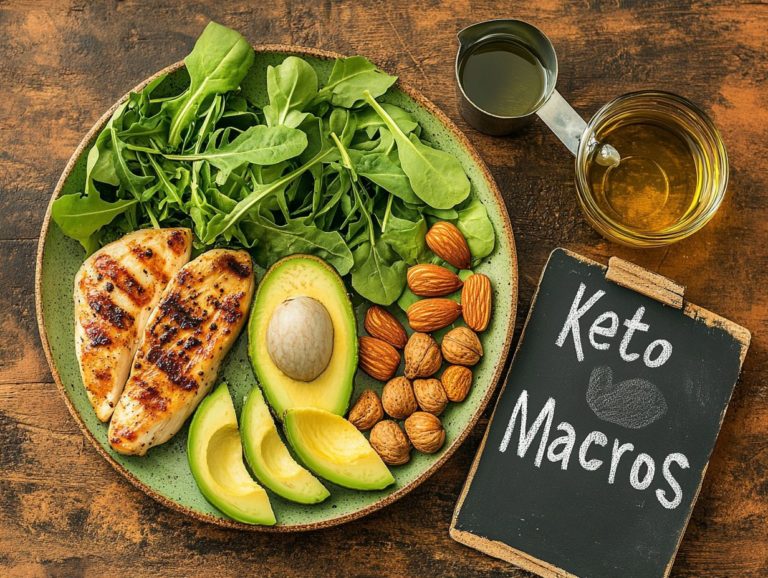Is Keto Right for Seniors? Common Questions
The keto diet has surged in popularity, garnering attention for its potential health benefits and as a dietary approach. You might be wondering, though, is it appropriate for seniors?
This exploration delves into the intricacies of the keto diet, shedding light on how it functions and assessing its safety for older adults. You’ll find an examination of the potential risks and benefits, particularly regarding concerns like cognitive decline, muscle loss, and chronic diseases such as diabetes and heart disease.
For those seniors considering this lifestyle shift, practical tips will be shared to help guide the way. Additionally, we ll address common misconceptions surrounding the diet, including its nutritional value and potential dietary changes.
Together, let’s uncover whether keto is a fitting option for the aging population.
Contents
- Key Takeaways:
- What is the Keto Diet?
- How Does the Keto Diet Work?
- Is the Keto Diet Safe for Seniors?
- What Are the Benefits of the Keto Diet for Seniors?
- How to Start the Keto Diet for Seniors?
- Is the Keto Diet Sustainable for Seniors?
- What Are Some Common Misconceptions About the Keto Diet for Seniors?
- Is the Keto Diet Only for Younger People?
- Is the Keto Diet Only for Athletes?
- Frequently Asked Questions
- Could the Keto Diet be the Right Choice for Seniors?
- What are the potential benefits of Keto for seniors?
- Are there any potential risks or side effects of Keto for seniors?
- Can Keto help with age-related muscle loss?
- Is Keto safe for seniors with a history of heart disease?
- Can seniors on Keto still enjoy their favorite foods?
Key Takeaways:
What is the Keto Diet?
The Keto diet, or ketogenic diet, presents a high-fat, low-carb approach to eating that transforms your daily dietary habits by significantly cutting back on carbohydrates and replacing them with healthy fats. The goal? To usher your body into a metabolic state known as ketosis process.
This nutritional strategy not only facilitates weight loss but also brings a host of health benefits, including enhanced blood sugar levels, improved diabetes management, and reduced inflammation, which makes it an appealing option for those looking to revamp their eating patterns.
Furthermore, the keto diet encourages a moderate intake of protein, allowing you to better manage your nutritional balance and support your overall health and wellbeing, vital for senior nutrition.
How Does the Keto Diet Work?
The Keto diet transforms your body s primary energy source from carbohydrates to fats through a remarkable process known as ketosis. This occurs when you significantly reduce your carbohydrate intake, prompting your body to turn to fat for fuel instead.
In this metabolic state, your liver works diligently to convert fats into ketones, offering an alternative energy source that can boost cognitive function and aid in weight loss. This shift in your diet not only stabilizes blood sugar levels but also facilitates effective weight management by curbing appetite and promoting fat metabolism.
Is the Keto Diet Safe for Seniors?
When contemplating the keto diet for seniors, it s essential to evaluate its safety and potential health risks, especially in light of their unique dietary restrictions and nutritional needs.
While this high-fat, low-carb approach may provide benefits like enhanced weight management and better blood sugar control, older adults should remain vigilant about the risk of nutrient deficiencies that can result from significant dietary changes.
Engaging with a nutritionist or healthcare provider is crucial in customizing the keto diet to align with their specific dietary requirements and health conditions and ensuring adherence to proper dietary guidelines.
What Are the Potential Risks for Seniors on the Keto Diet?
The potential risks for you as a senior on the keto diet include nutrient deficiencies, which can stem from limited food choices, as well as adverse effects on cognitive function and joint pain. This highlights the necessity for careful meal planning to guarantee that your nutritional intake remains adequate, including consideration of processed foods and whole grains.
You might also face complications such as increased blood cholesterol levels or gastrointestinal issues due to the high-fat nature of the diet. It’s crucial for you to understand these risks and monitor your health closely while embracing a ketogenic approach.
These concerns emphasize the importance of vitamin supplementation, as essential nutrients can become scarce when you adhere to a high-fat, low-carbohydrate regimen. Consider incorporating a variety of low-carb vegetables and potentially dietary supplements to fill any nutritional gaps, ensuring your nutrient intake meets dietary needs.
Implementing effective meal management strategies, like portion control and balanced food combinations, can help mitigate some adverse effects, ultimately enhancing your overall wellbeing. Engaging with healthcare professionals to tailor your dietary choices to your individual health needs will ensure you maintain vital nutrients while reaping the potential benefits of a keto lifestyle, considering aspects such as calorie intake and food restrictions.
What Are the Benefits of the Keto Diet for Seniors?
The keto diet presents a wealth of health benefits specifically for seniors, such as effective weight loss, better diabetes management, and potential decreases in inflammation and joint pain making it an enticing dietary option for many older adults. Embracing this lifestyle choice can also enhance overall senior nutrition.
By embracing this low-carb, high-fat approach, you’re encouraging your body to burn fat as its primary fuel source, which can lead to noteworthy enhancements in blood sugar regulation and cognitive function, ultimately elevating your overall quality of life.
Additionally, personalized meal planning can optimize these advantages while mitigating any risks related to nutrient deficiencies, ensuring nutritional goals are met.

Emerging research indicates that the keto diet may offer significant benefits in combating age-related cognitive decline, particularly for individuals dealing with conditions such as Alzheimer’s disease. By entering a state of ketosis, you provide your brain with an alternative energy source that fuels activity while simultaneously reducing inflammation. This dietary approach not only enhances cognitive function but also promotes overall brain health by stabilizing blood sugar levels, potentially preventing further degeneration. It is a dietary change worth considering for its numerous cognitive benefits.
Studies suggest that the ketones generated during ketosis serve as a more efficient energy source for neurons, supporting their function even as glucose metabolism declines. Additionally, research has unveiled the keto diet s promising effects in reducing oxidative stress and inflammation two critical factors linked to neurodegenerative diseases. This underscores the diet’s potential in supporting cognitive function and resilience.
Through a careful examination of clinical trials and observational studies, experts underscore the compelling connection between sustained ketosis and improved cognitive performance markers. This paves the way for future investigations into this low-carb lifestyle, positioning it as a viable strategy for maintaining cognitive vitality and resilience against degenerative disorders. This dietary approach could be crucial in managing Alzheimer s disease and other related conditions.
The keto diet can significantly help with age-related muscle loss, known as sarcopenia. It emphasizes moderate protein intake along with healthy fats.
This combination aids in muscle preservation and supports overall weight management and strength. By embracing this dietary shift, seniors can maintain their strength and mobility.
To get the essential nutrients for muscle synthesis, seniors should focus on nutrient-dense foods that align with keto’s macronutrient ratios. Think avocados, olive oil, fatty fish, and low-carb vegetables.
Including protein sources like poultry, eggs, and legumes in your meals will be key. These foods enhance the diet’s effectiveness.
Consulting a healthcare professional or a dietitian can help tailor this diet to your needs. This approach supports successful weight management and boosts daily vitality.
Research suggests that the keto diet can be an ally in managing age-related chronic diseases like diabetes and heart disease. It reduces inflammation and stabilizes blood sugar levels, making it beneficial for older adults.
The keto diet’s high-fat, low-carb foundation supports weight loss and positively influences health outcomes. It offers protection against chronic conditions that often accompany aging.
By cutting back on carbohydrates, you encourage your body to enter ketosis. This metabolic state is crucial for effective weight management and helps reduce insulin resistance, which is common for seniors with diabetes.
The keto diet improves heart health by lowering triglycerides and boosting HDL cholesterol levels. Embracing this strategy can lead to increased vitality and an improved quality of life.
How to Start the Keto Diet for Seniors?
Starting the keto diet as a senior requires careful meal planning and awareness of dietary adjustments. This ensures you meet your nutritional needs while following low-carbohydrate, high-fat principles.
Select food options that fit the ketogenic diet and consider any dietary restrictions or preferences. With a thoughtful approach, you can enjoy the benefits of the keto diet without compromising your health.
As you consider the keto diet, it’s essential to understand the best food choices tailored for seniors.
What Foods Should Seniors Eat on the Keto Diet?
As a senior following the keto diet, it s important to prioritize food choices that are rich in healthy fats, moderate in protein, and extremely low in carbohydrates. Focus on nutrient-dense options like avocados, nuts, seeds, and fatty fish. Incorporating these foods not only supports your journey into ketosis but also ensures you meet your nutritional needs without relying on processed foods or unhealthy fats that could compromise your well-being. Don’t forget to consider your calorie intake and overall nutritional value to maintain a balanced diet.
Including olive oil can greatly benefit you. It’s packed with monounsaturated fats that promote heart health. Coconut oil is another excellent choice, known for its medium-chain triglycerides (MCTs) that provide a quick energy boost.
Leafy greens like spinach and kale are superb options as well; they offer a wealth of vitamins and minerals while keeping your carbohydrate intake low. Eggs, brimming with protein and healthy fats, are fantastic for muscle maintenance a crucial factor as you age. These foods help reduce joint pain and provide necessary nutrients to support cognitive function and overall senior nutrition.
By bringing together these foods, you can create a diverse and balanced menu that supports your overall health while adhering to keto guidelines. This way, you will meet your dietary needs and promote healthy eating.
What Foods Should Seniors Avoid on the Keto Diet?
As a senior on the keto diet, it’s crucial to avoid high-carbohydrate foods like bread, pasta, rice, and sugary snacks. These can disrupt the ketosis process and undermine the benefits of this dietary approach. It s equally important to avoid processed foods that often harbor unhealthy fats and additives, which can pose serious health risks, especially for older adults with specific dietary restrictions.
Instead, you should focus on nutrient-dense alternatives. Incorporating leafy greens, avocados, nuts, and healthy oils into your meals not only helps maintain stable energy levels but also provides vital vitamins and minerals that support your overall health. These choices help reduce inflammation and manage dietary changes effectively.
Limit or eliminate foods high in trans fats and sugars, as these can contribute to inflammation, weight gain, and chronic diseases. By making thoughtful dietary choices and prioritizing whole, unprocessed foods, you can better support your well-being and effectively embrace the ketogenic lifestyle. Consider incorporating vitamin supplementation to address any potential nutrient deficiencies.
What Are Some Tips for Seniors Starting the Keto Diet?

As you embark on the keto diet, it s vital to approach it with practical strategies that work for you. Start by gradually reducing your carbohydrate intake, staying well-hydrated, and closely monitoring your nutritional intake. This way, you can reach your dietary goals without overwhelming your body. Pay attention to your balance of fats, proteins, and carbs to ensure a balanced intake.
Embracing the keto lifestyle as a long-term commitment rather than a fleeting diet will help you adapt more smoothly and stick to your new eating habits. This approach will significantly improve your diabetes management and inflammation reduction as you age.
Meal planning holds significant importance in your journey. By prepping your meals in advance, you not only save time and effort but also ensure that you adhere to your dietary guidelines. Remember, staying hydrated is crucial as well. This supports your overall health, helps ease some of the keto flu symptoms that may arise during the transition, and aids in managing your daily eating habits.
You might also find it beneficial to tap into resources like nutritional guides, which clarify your food choices. Joining support groups can be invaluable too, as they provide a platform to share experiences and tips, creating a sense of community and motivation throughout your transformative journey. Consulting a nutritionist can also provide personalized advice tailored to your specific needs.
Is the Keto Diet Sustainable for Seniors?
The sustainability of the keto diet for you as a senior depends on your ability to embrace this dietary approach as a long-term lifestyle choice rather than a fleeting change. This transition necessitates careful meal planning and thoughtful consideration of your individual preferences and health needs, including managing potential health risks and ensuring adequate nutrient intake.
To effectively maintain the keto diet, you should concentrate on crafting a balanced meal plan that includes a variety of healthy fats, moderate amounts of protein, and limited carbohydrates. This way, you can meet your nutritional goals while also promoting your overall health.
Are you ready to explore the benefits of the keto diet?
What Are Some Tips for Maintaining the Keto Diet in the Long-term?
To maintain the keto diet in the long term, it’s essential for you to adopt effective strategies such as:
- Meal prepping
- Keeping a food journal
- Involving friends or family in your diet journey
By creating a supportive environment, you enhance your chances of sticking with this lifestyle choice. Pay attention to your body’s metabolism to ensure you’re effectively managing your dietary changes.
Establishing a routine helps manage your nutritional intake. It also allows you to fully enjoy the benefits of the keto diet. This can help in managing your weight and improving your overall well-being.
In addition to these practices, it’s important for you to experiment with a variety of keto-friendly recipes to keep your meals interesting and satisfying. Incorporating seasonal vegetables and lean proteins will enhance the diversity of your diet, turning each meal into something to eagerly anticipate. Be mindful of your dietary supplements and nutritional goals to ensure a well-rounded diet.
Utilizing apps or journals can simplify the process of tracking your progress, helping you identify any trends or triggers in your eating habits so you can make necessary adjustments promptly.
Forming or joining support groups, whether in person or online, can foster a sense of encouragement and accountability. This social aspect not only fuels your motivation but also offers a platform for sharing tips on overcoming challenges, ultimately creating a more enriching experience as you navigate the ketogenic lifestyle. Remember, consulting a nutritionist can provide additional guidance tailored to your specific needs.
What Are Some Common Misconceptions About the Keto Diet for Seniors?
You might have encountered some common misconceptions surrounding the keto diet for seniors, such as the belief that it s solely a weight loss strategy or that it s primarily intended for younger individuals or athletes. The truth is that the keto diet can be expertly tailored to cater to the unique dietary requirements of seniors. It offers essential health benefits, including enhanced cognitive function, reduced inflammation, and improved management of chronic conditions like heart disease and diabetes. This dietary approach can also help in addressing age-related health concerns.
Is the Keto Diet Only for Weight Loss?
While the keto diet is often celebrated for its effectiveness in weight loss, it encompasses much more than just that. It presents a range of significant health benefits, including improved management of chronic diseases, enhanced cognitive function, and reduced inflammation. Many seniors embrace the keto diet to elevate their overall health and wellbeing, not merely to lose a few pounds.
Numerous studies indicate that adhering to a ketogenic lifestyle can assist in managing conditions such as epilepsy, type 2 diabetes, and even certain cancers. The diet’s low carbohydrate content plays a crucial role in stabilizing blood sugar levels, providing particular advantages for those grappling with insulin resistance. Additionally, the high-fat intake can stimulate the production of ketones, which may offer mental clarity and potentially lower the risk of neurodegenerative diseases such as Alzheimer’s disease.
Beyond the realm of physical health, many individuals report a noticeable boost in mood and energy levels while following this diet. This makes the keto approach an attractive option for anyone looking to optimize their health in a holistic manner. Remember to consult with your healthcare provider about any potential dietary supplements you may need.
In conclusion, the keto diet can be a sustainable option for seniors when approached thoughtfully. It s essential to consult healthcare professionals to tailor the diet to your needs. Why not try a new keto recipe this week and see how you feel?
Is the Keto Diet Only for Younger People?
The keto diet isn’t just for the younger crowd; it can be incredibly beneficial for seniors looking to enhance their dietary choices for better health and longevity. By emphasizing healthy fats and moderate protein, you can customize the keto diet to align with your specific nutritional needs and support optimal health outcomes as you age.
It also helps stabilize blood sugar levels and manage weight loss. This dietary approach focuses on reducing carbohydrate intake, which can aid in managing weight and potentially alleviating age-related health concerns such as diabetes and heart disease.
Many older adults find it challenging to maintain their energy levels and cognitive function. The keto diet’s ability to provide a steady energy source through ketones can be particularly advantageous. This approach helps in stabilizing blood sugar levels and promoting healthy eating.
Incorporating foods rich in nutrients into your meals ensures a well-rounded diet that caters to the varied needs of seniors. By making thoughtful dietary choices, you can fully harness the benefits of the keto diet to enhance your quality of life and overall well-being.
Is the Keto Diet Only for Athletes?

Contrary to popular belief, the keto diet isn t just for athletes. While it can certainly give a boost to athletic performance and aid in weight loss for some, it s also a fantastic option for seniors and anyone with unique health goals and dietary needs.
The beauty of the keto diet lies in its adaptability, allowing you to tailor it to your lifestyle and enhance your health outcomes, no matter how active you are. This diet can also be beneficial in managing eating habits and preventing eating disorders.
For seniors, the keto diet can deliver a host of benefits, including improved cognitive function and better blood sugar management. This makes it an excellent choice for those looking to maintain their vitality in their golden years.
But don t think it stops there; non-athletes can also reap the rewards of this dietary approach. With its focus on healthy fats and reduced carbs, it can support weight management and promote overall well-being.
By prioritizing foods rich in nutrients, this diet opens up a world of diverse meal options that can be customized to fit your individual preferences and lifestyle. By sticking to the dietary guidelines, you can savor the satisfying versatility of keto while progressing toward optimal health.
Frequently Asked Questions
Could the Keto Diet be the Right Choice for Seniors?
Keto, short for the ketogenic diet, is a high-fat, low-carbohydrate diet that has gained popularity in recent years. It is often recommended for weight loss and improving overall health. But is it suitable for seniors?
What are the potential benefits of Keto for seniors?
Keto has been shown to improve heart health, blood sugar control, and brain function. These are all concerns for seniors. It may also help with weight loss and reducing inflammation.
Are there any potential risks or side effects of Keto for seniors?
While Keto can have numerous benefits, it is not suitable for everyone. Seniors with certain medical conditions, such as kidney disease or diabetes, should consult with their doctor before starting the diet. Some seniors may experience side effects such as constipation, fatigue, or nutrient deficiencies.
Yes, Keto can help with preserving muscle mass in seniors. As we age, we tend to lose muscle mass, leading to decreased strength and mobility. Keto provides ample protein and fat to support muscle maintenance and growth.
Is Keto safe for seniors with a history of heart disease?
Keto has been shown to improve heart health. However, seniors with a history of heart disease should consult with their doctor before starting the diet. They may need to make modifications to ensure their heart health is not compromised.
Can seniors on Keto still enjoy their favorite foods?
Yes, seniors on Keto can still enjoy their favorite foods, but they may need to make modifications to fit them into their diet plan. For example, they can make low-carb versions of their favorite dishes or find keto-friendly substitutes for certain ingredients.
Take Action: Before embarking on the keto journey, be sure to consult with your healthcare provider to ensure it aligns with your health needs and goals.







